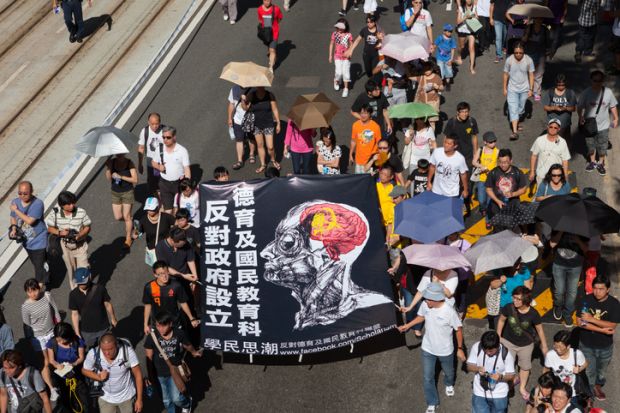More than two-thirds of scholars in Hong Kong believe that the level of academic freedom in the territory has declined over the past year, according to a study.
A survey of 246 academics, carried out last month, found that 37 per cent thought the state of academic freedom in Hong Kong had “significantly decreased” compared with a year ago, while 30.9 per cent said it had “slightly decreased”.
Just over a quarter of respondents (25.6 per cent) said the level of academic freedom was “unchanged”.
Respondents were also asked to rate which people or institutions had the most influence over the level of academic freedom. Funding bodies and university management were deemed to be the major factors, with more than 170 academics rating them between 6 and 10 on a scale where 10 is the “most influential” (and zero is the “least influential”).
Central government and Hong Kong government officials were viewed as less influential, with 133 and 146 scholars respectively rating these people in the highest influence category.
The 2019 Hong Kong Academic Freedom Report was published by the Progressive Scholars Group, a network of Hong Kong academics aimed at promoting academic autonomy and “a strong civil society”.
Brian Fong, a political scientist at the Education University of Hong Kong and secretary-general of the group’s executive committee, said that while research council funding applications in Hong Kong were reviewed by international academics “who have a high level of impartiality and a low potential risk of conflicts of interest”, public policy research grant applications were assessed by local academics and government officials.
He added that the Chinese government was creating a “high-pressured environment so academics will self-censor”.
The report claims that there were a total of 22 threats to academic freedom in Hong Kong over the past 12 months, eight of which were “personal attacks or pressures on scholars”.
According to the study, these included universities banning discussions on Hong Kong independence; a US scholar being barred from entering Hong Kong a week after testifying at the US Congressional-Executive Commission on China about the protests in the city; and a Hong Kong publisher cancelling the publication of a book after the author refused to amend a section on the Tiananmen Square protests.
Hong Kong universities’ removal of the word “national” from the name of higher education institutions in Taiwan was also included in the list.
“2019 will be remembered as the worst year so far for Hong Kong’s academic freedom,” the report says. “China’s tightening authoritarian controls were reflected not only in the worsening assessment of the state of academic freedom amongst Hong Kong’s professorial, teaching and research staff…they were also illustrated through the growing self-censorship of the university management.”
Register to continue
Why register?
- Registration is free and only takes a moment
- Once registered, you can read 3 articles a month
- Sign up for our newsletter
Subscribe
Or subscribe for unlimited access to:
- Unlimited access to news, views, insights & reviews
- Digital editions
- Digital access to THE’s university and college rankings analysis
Already registered or a current subscriber? Login








